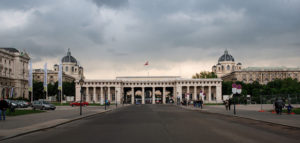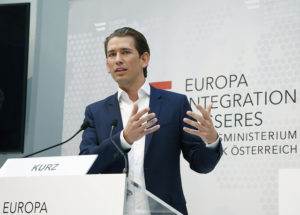
It is International Migrants Day. And December 18, 2017 is also the day Austria’s Prime Minister, Sebastian Kurz, officially became the EU’s youngest leader.
Just last week, as Prime Minister Elect, he formed Austria’s current governing coalition. International newspapers ran a December 15, 2017 Reuters story about it titled, “Austrian conservatives bring far right into government”. Its authors wrote that,
“Austria is set to become the only western European country with a far-right party in government after the anti-immigration Freedom Party and Sebastian Kurz’s conservatives struck a coalition deal to share power almost equally.”
At least one thing the Freedom Party’s leader said seemingly conflicts with the views of a past Freedom Party star, Nazi sympathizer Jörg Haider, as well as many others today. The Times of Israel newspaper December 11, 2017 article, “Austrian far-right leader sympathetic to Israel on Jerusalem recognition”, informed readers that,
“The leader of Austria’s far-right party … expressed sympathy for Israel’s desire to have all embassies in Jerusalem. Yet at the same time, Hans-Christian Strache, the head of the controversial Freedom Party, said that his country is bound to European consensus and cannot act alone in such matters.”
Main Issue

Prime Minister Kurz
Kurz’s Austrian People’s Party, and their coalition partner, the populist Freedom Party, attracted numerous votes because their anti-migration stance resonated so well with the voters. That also was a defining issue in other recent European elections.
Some advocate a cautious “let’s wait and see” attitude toward the new government. Not surprisingly, others feel that what happened is especially alarming. They fear that the coalition could further energize extreme right elements in Austria, in parts of Germany, and across the rest of Europe.
The Neighborhood
An ultra-conservative political bloc of several nations continues to set the pace for other conservative groups in Europe. These countries are located in the region immediately east of Austria and Germany.
Deutsche Welle thinks Austria will likely side with the bloc in an ongoing disagreement with Brussels. In a December 13, 2017 article, “EU reignites dispute over refugee quotas ahead of Brussels summit”, DW News explained,
“At the heart of the dispute — and topping the meeting’s agenda — is an EU quota system to distribute tens of thousands of refugees across EU member nations. …”
Hungary, Poland, Slovakia and the Czech Republic fiercely opposed the plan from the start and have repeatedly refused to accept asylum seekers.”
Tomorrow’s Europe?
One key difference exists between Austria and the bloc; Austria’s Prime Minister likes the idea of a United States of Europe.
Austria’s post-communist neighbors, though, well remember what it was like to be ruled from Russia. The bloc is highly supportive of a common EU defense program (see our related ITN article: “September 14, 2016 – Push for Militarized EU “) but, otherwise, currently hates the thought of someone in Brussels getting more power to tell them what to do. That too can change.
Watch closely this part of Europe. It might be an initial peek at where the continent is heading.
Photo Credits: Vienna Landmark by Xiquinho Silva, License: CC BY 2.0; Austrian Prime Minster Kurz courtesy of the Federal Ministry of Europe, License: CC BY-SA 2.0.